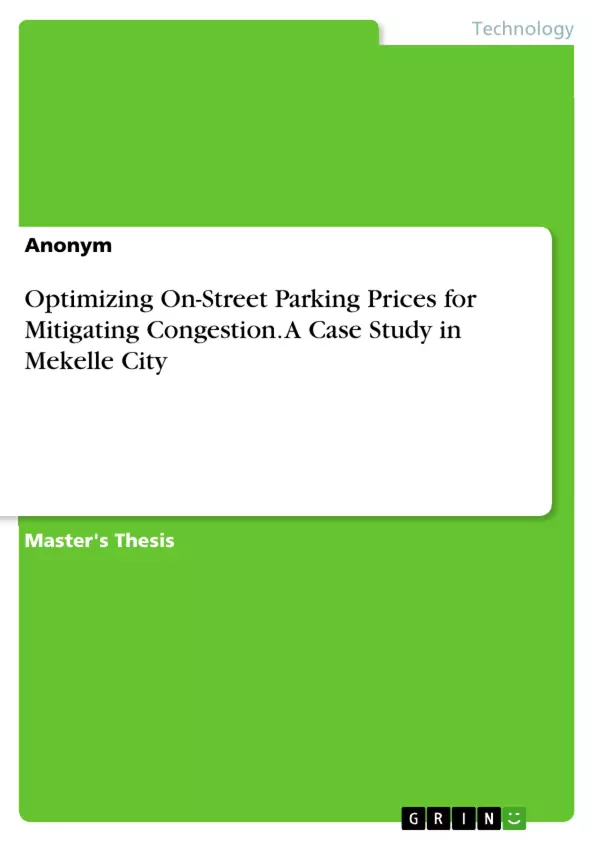Urbanization in Mekelle City has brought about a pressing issue of roadside congestion due to on-street parking, adversely impacting sustainable urban transport. This study delves into the development of an effective on-street parking price policy as a strategic measure to alleviate congestion and examines its impact on travel mode choice in Mekelle City. Utilizing parking inventory and utilization survey data, the study employs the price elasticity equation to calculate the optimum parking price. Results reveal that current parking occupancy exceeds 85%, surpassing the required capacity, with demand outstripping availability. However, implementing the optimal parking price during peak hours demonstrates a substantial decrease in parking demand, achieving a balanced utilization level of 100% safe occupancy. These findings provide a functional basis for future on-street parking price design in urbanized areas, emphasizing the potential for sustainable urban transport improvements.
Inhaltsverzeichnis (Table of Contents)
- 1. Introduction
- 1.1. Background
- 1.2. Statement of the Problem
- 1.3. Objectives
- 1.3.1. General objective
- 1.3.2. Specific objective
- 1.4. Scope of the study
- 1.5. Limitation of the study
- 1.6. Significance of the Study
- 2. Literature review
- 2.1. Overview
- 2.2. What is the parking system?
- 2.3. On-street parking system
- 2.4. Ill effects of on-street Parking
- 2.5. Possible parking policy and access management
- 2.6. Parking price policy and previous studies
- 2.6.1 Parking price optimizing methods
- 2.6.2. Application of parking price elasticity for on-street parking demand
- 2.6.3. Influence of on-street parking price on travel mode choice
- 2.7. Parking data
- 2.8. Parking space capacity determination
- 2.9. Parking survey methods
- 2.9.1. In-out survey
- 2.9.2. License plate method of survey
- 2.10. Different studies on car parking system in Ethiopia
- 2.11. Summary and gap of the literature
- 3. Materials and Methods
- 3.1. Overview
- 3.2. Description of the study area
- 3.3. Vehicle Classification
- 3.4. Data collection
- 3.4.1 Parking usage survey data
- 3.4.2. Parking lot capacity determination
- 3.5. The method used to optimize on-street parking price
- 3.6. Developing of linear empirical equation for optimizing of on-street parking price
- 3.7 The effect of on-street parking price on travel mode choice
- 3.8. Data Analysis tools
- 4. Results and discussions
- 4.1. Investigate the existing condition of the on-street parking system
- 4.1.1. Determining average vehicles parking duration
- 4.1.2 Existing parking supply (capacity)
- 4.1.3 Existing parking usage
- 4.2. Determine the parking price elasticity value (n)
- 4.3. Determine optimum on-street parking price and its effect on parking demand
- 4.4. Determine the effect of on-street parking price on travel mode choice
- 4.5. How to apply on-street parking price policy in Mekelle city
- 4.6. Application of on-street parking price policy on transportation
- 5. Conclusions and Recommendations
- 5.1. Conclusions
Zielsetzung und Themenschwerpunkte (Objectives and Key Themes)
This thesis aims to define the optimal on-street parking price policy in Mekelle city as a means to mitigate traffic congestion and examine its influence on travel mode choice. The study analyzes the existing parking system, investigates the relationship between parking prices and demand, and assesses the impact of price adjustments on travel behavior.
- Optimizing on-street parking price policy in Mekelle city
- Impact of parking price on travel mode choice
- Parking demand and supply analysis
- Parking price elasticity and its application
- Sustainable urban transportation and traffic congestion mitigation
Zusammenfassung der Kapitel (Chapter Summaries)
- Chapter 1: Introduction
- Chapter 2: Literature Review
- Chapter 3: Materials and Methods
- Chapter 4: Results and Discussions
This chapter sets the context for the study by introducing the problem of on-street parking congestion in Mekelle city. It discusses the impact of the problem on sustainable urban transportation, including accessibility, environmental quality, and traffic flow. The chapter defines the general and specific objectives of the study, outlines its scope and limitations, and highlights its significance.
This chapter provides an overview of existing literature related to parking systems, on-street parking, and the effects of parking policies. It explores different parking price policies and their impact on demand and travel mode choice. The chapter reviews methods for optimizing parking prices, considering price elasticity and its application in urban contexts. It also discusses parking data, survey methods, and relevant studies conducted in Ethiopia.
This chapter describes the methodology employed in the study. It details the study area, vehicle classification, and data collection methods, including parking usage surveys and capacity assessments. The chapter explains the optimization method used for on-street parking prices and the development of empirical equations for price adjustment. It also outlines the tools used for data analysis.
This chapter presents the findings of the study, including the investigation of the existing parking system, the analysis of parking price elasticity, and the determination of optimal on-street parking prices. The chapter explores the impact of price adjustments on parking demand and travel mode choice. It discusses the application of the parking price policy in Mekelle city and its potential influence on transportation.
Schlüsselwörter (Keywords)
This study focuses on key terms and concepts such as on-street parking, parking price policy, parking price elasticity, travel mode choice, urban transportation, traffic congestion, sustainable development, and data analysis.
- Quote paper
- Anonym (Author), 2019, Optimizing On-Street Parking Prices for Mitigating Congestion. A Case Study in Mekelle City, Munich, GRIN Verlag, https://www.grin.com/document/1436940



